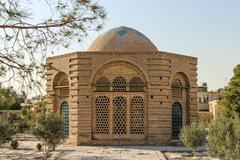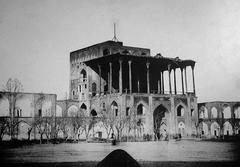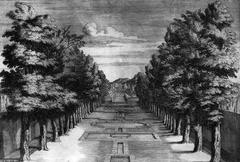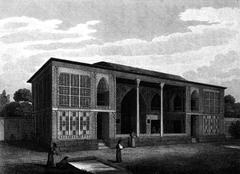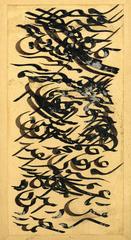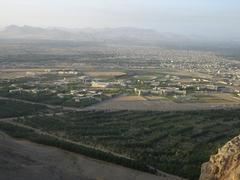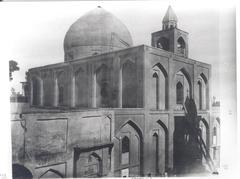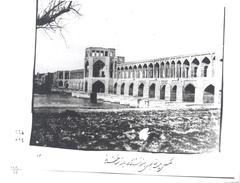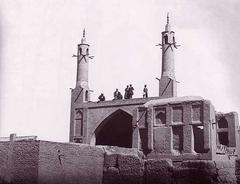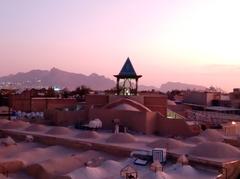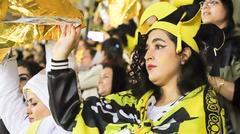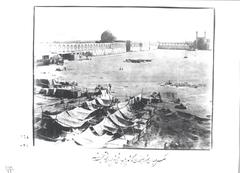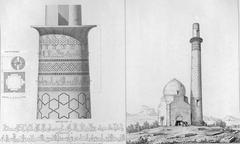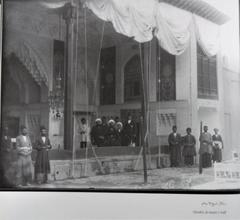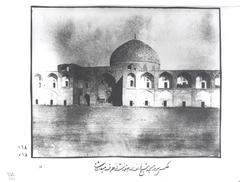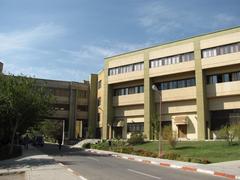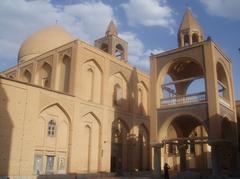Safa Mosque: Visiting Hours, Tickets, and Historical Significance in Isfahan, Iran
Date: 03/07/2025
Introduction
Safa Mosque (Masjid-e Safa), located in the historic city of Isfahan, is a striking example of Persian-Islamic architecture and a vibrant center of spiritual life. Originally constructed during the Qajar dynasty in the late 19th century, the mosque not only reflects the architectural evolution of its time but also continues to serve as a hub for religious gatherings and community life. Its position near the Shahshahan Mausoleum places it at the heart of Isfahan’s rich religious landscape, making it a must-visit destination for those interested in Iran’s cultural heritage (Iranopedia; Wikipedia).
This guide provides in-depth information for visitors, including historical and architectural insights, practical tips on visiting hours, tickets, dress code, accessibility, and recommendations for nearby attractions. Whether you are drawn by history, architecture, or religious tradition, Safa Mosque offers a compelling window into Isfahan’s legacy (Surfiran; Backpack Adventures).
Table of Contents
- Historical Origins and Qajar Era Context
- Architectural Features and Artistic Highlights
- Religious and Cultural Significance
- Visiting Safa Mosque: Hours, Tickets, and Accessibility
- Dress Code and Visitor Etiquette
- Photography Guidelines
- Special Events and Religious Observances
- Nearby Attractions and Travel Tips
- Guided Tours and Educational Experiences
- Practical Amenities and Safety
- Frequently Asked Questions (FAQ)
- Conclusion and Recommendations
- References
Historical Origins and Qajar Era Context
Safa Mosque was founded in 1290 AH (1873/1874 CE) under Qajar rule, a period characterized by efforts to revive Persian culture and religious institutions after the upheavals of the early 18th century (Wikipedia). Commissioned by Sayyed Mohammad Ali Golestaneh, the mosque is renowned for its elegant Thulth script inscriptions—crafted by calligrapher Mohammad Taghi Ben Mohammad Ibrahim—set against deep blue tilework.
The Qajar dynasty (1789–1925) contributed significantly to Isfahan’s urban and spiritual renewal, constructing religious buildings that, while less monumental than those of the Safavid era, were rich in decorative detail and community function (Iransafar).
Architectural Features and Artistic Highlights
Qajar Style and Aesthetic Elements
- Tilework & Calligraphy: The mosque’s facades and iwans are adorned with vivid tile mosaics and intricate calligraphy, exemplifying Qajar-era artistry (Wikipedia).
- Structural Layout: Safa Mosque features a harmonious blend of traditional Persian mosque architecture and more modest Qajar sensibilities—modest in size but rich in detail.
- Urban Integration: Located near the Shahshahan Mausoleum, the mosque is woven into Isfahan’s historic religious district (Smarthistory).
Religious and Cultural Significance
Safa Mosque is more than an architectural landmark; it is a living center of Shi’ite worship and religious education. The mosque hosts daily prayers, commemorations during Muharram and Ashura, and other community gatherings, reinforcing its role as a spiritual anchor within Isfahan (Iranopedia).
Visiting Safa Mosque: Hours, Tickets, and Accessibility
- Visiting Hours: Generally open from 8:00 AM to 6:00 PM daily. Hours may vary during religious holidays and special events; always check locally or with your accommodation (Backpack Adventures).
- Tickets: Entry is typically free, but donations are appreciated to support the mosque’s upkeep.
- Accessibility: The mosque is within walking distance of Isfahan’s city center. It is partially wheelchair accessible, with ramps at main entrances, though some areas may have steps. For those with mobility concerns, inquire in advance.
Dress Code and Visitor Etiquette
- Men: Wear long pants and sleeved shirts; avoid shorts and sleeveless tops.
- Women: A headscarf is mandatory, along with loose-fitting clothing covering arms and legs (Blue Mosque Dress Guide).
- Footwear: Remove shoes before entering prayer halls.
- Behavior: Maintain quiet, respectful conduct and avoid disruptive activities.
These guidelines preserve the mosque’s atmosphere of reverence (Blue Mosque Dress Guide).
Photography Guidelines
Photography is generally allowed, but avoid using flash and always ask permission before photographing people, especially during prayers or ceremonies. Some areas may restrict photography—follow posted signs and respect worshippers (Backpack Adventures).
Special Events and Religious Observances
During periods like Ramadan, Muharram, and the Itikaf ritual, access may be limited or restricted to worshippers only. These occasions offer unique cultural insights but may affect tourist access; plan accordingly (Backpack Adventures).
Nearby Attractions and Travel Tips
Safa Mosque is proximate to key Isfahan landmarks including:
- Naqsh-e Jahan Square
- Shahshahan Mausoleum
- Jameh Mosque of Isfahan
- Sheikh Lotfollah Mosque
- Grand Bazaar
Visit early or late in the day for cooler temperatures and optimal lighting for photography. Spring and autumn are the most pleasant seasons for sightseeing (Backpack Adventures).
Guided Tours and Educational Experiences
Local guides offer tours with in-depth commentary on the mosque’s history, architecture, and significance. Consider booking a tour through your hotel or a reputable agency (Surfiran).
Practical Amenities and Safety
- Facilities: Basic amenities are available (restrooms, ablution areas). Carry tissues and hand sanitizer.
- Water: Bring your own drinking water, especially in summer.
- Safety: Isfahan is generally safe, but solo travelers—especially women—should follow local customs and dress codes for comfort and respect.
Frequently Asked Questions (FAQ)
Q: Is there an entrance fee?
A: Entry is free, with donations encouraged.
Q: When is the best time to visit?
A: Spring and autumn offer mild weather and fewer crowds.
Q: Are guided tours available?
A: Yes, through local agencies or accommodations.
Q: Is the mosque accessible to wheelchair users?
A: Partially; some areas may be challenging—check in advance for assistance.
Q: Is photography allowed?
A: Generally yes, but be discreet and respectful.
Conclusion and Recommendations
Safa Mosque epitomizes Isfahan’s enduring religious and artistic legacy. Its Qajar-era architecture, exquisite tilework, and active role in the community make it a compelling destination for travelers seeking to understand Iran’s cultural identity. For the most rewarding experience, respect local customs, visit during recommended hours, and consider a guided tour.
Download the Audiala app for the latest updates, tour bookings, and exclusive insights into Isfahan’s historical treasures. Follow us on social media for news on preservation projects and cultural events.
References
- Safa Mosque, Isfahan, Wikipedia
- Isfahan, Iranopedia
- Exploring Safa Mosque in Isfahan: History, Architecture, and Visitor Guide, Iransafar
- The Great Mosque or Masjid-e-Jameh of Isfahan, Smarthistory
- Safa Mosque Visiting Hours, Tickets & Architectural Highlights in Isfahan, Surfiran
- Safa Mosque Visiting Hours, Tickets & Tips for Exploring Isfahan’s Historical Sites, Backpack Adventures
- Shah Mosque (Imam Mosque) in Isfahan: Visiting Hours, Tickets, and Cultural Significance, IranAmaze
- How to Dress Appropriately When Visiting Mosques, Blue Mosque Dress Guide
